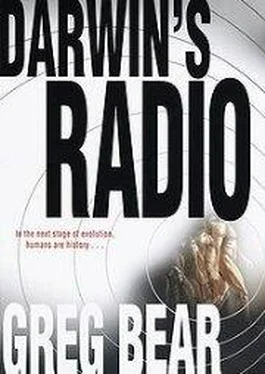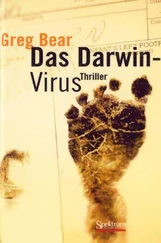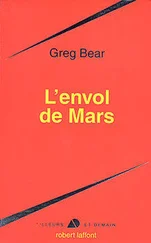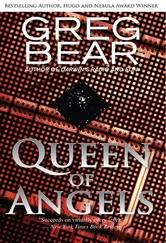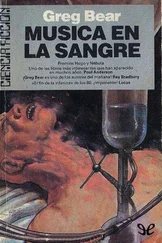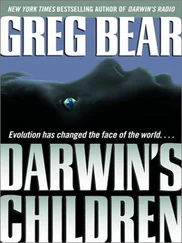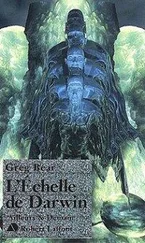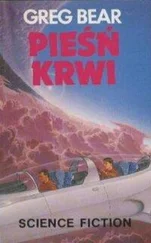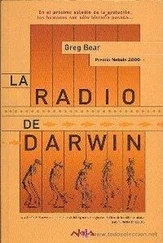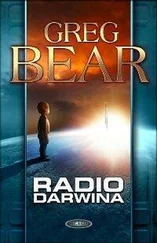Kaye looked aside and smiled. “I won’t say that.”
“You’ve seen this before? In other women?”
“I think we’re going to see more of it.”
“And the babies will all be monsters and die?”
Kaye shook her head. “I think that’s going to change.”
Jacobs replaced his pen in his pocket, put his hand on the desktop blotter, lifted its leather corner, dropped it slowly. “I won’t file a report on Delia. I’m not sure what I’d say, or who I’d say it to. I think she’d vanish before any authorities could come along to help her. I doubt we’d ever find the infant, where they buried it. She’s tired and she needs steady nourishment. She needs a place to stay and rest. I’ll give her a vitamin shot and prescribe antibiotics and iron supplements.”
“And the marks?”
“Do you know what chromatophores are?”
“Cells that change color. In cuttlefish.”
“These marks can change color,” Jacobs said. “They’re not just a hormonally induced melanosis.”
“Melanophores,” Kaye said.
Jacobs nodded. “That’s the word. Ever seen melanophores on a human?”
“No,” Kaye said.
“Neither have I. Where are you going, Ms. Lang?”
“All the way west,” she said. She lifted her wallet. “I’d like to pay you now.”
Jacobs gave her his saddest look. “I’m not running a goddamned HMO, Ms. Lang. No charge. I’ll prescribe the pills and you pick them up at a good pharmacy. You buy her food and find her a clean place to get a good night’s sleep.”
The door opened and Delia and Jayce emerged. Delia was fully dressed.
“She needs clean clothes and a good soak in a hot tub,” Georgina said firmly.
For the first time since they had met, Delia smiled. “I looked in the mirror,” she said. “Jayce says the marks are pretty. The doctor says I’m not sick, and I can have children again if I want.”
Kaye shook Jacobs’s hand. “Thank you very much,” she said.
As the three of them left through the front office, joining Mitch and Morgan on the front porch, Jacobs called out, “We live and we learn, Ms. Lang! And the faster we learn, the better.”
The little motel sported a huge red sign with TINY SUITES and $50 crowded onto it, clearly visible from the freeway. It had seven rooms, three of them vacant. Kaye rented all three and gave Morgan his own key. Morgan lifted the key, frowned, then pocketed it.
“I don’t like being alone,” he said.
“I couldn’t think of another arrangement,” Kaye said.
Mitch put his arm around the boy’s shoulder. “I’ll stay with you,” he said, and gave Kaye a level look. “Let’s get cleaned up and watch TV”
“We’d like you to stay in our room,” Jayce told Kaye. “We’d feel a lot safer.”
The rooms were just on the edge of being dirty. Draped on beds with distinct hollows, thin and worn quilted coverlets showed unraveled nylon threads and cigarette burns. Coffee tables bore multiple ring marks and more cigarette burns. Jayce and Delia explored and settled in as if the accommodations were royal. Delia took the single orange chair beside a table-lamp combo hung with black metal cone-shaped cans. Jayce lounged on the bed and switched on the TV. “They have HBO,” she said in a soft and wondering voice. “We can watch a movie!”
Mitch listened to Morgan in the shower in their room, then opened the front door. Kaye stood outside with her hand up, about to knock.
“We’re wasting a room,” she said. “We’ve taken on some responsibilities, haven’t we?”
Mitch hugged her. “Your instincts,” he said.
“What do your instincts tell you?” she asked, nuzzling his shoulder.
“They’re kids. They’ve been out on the road for weeks, months. Someone should call their parents.”
“Maybe they never had real parents. They’re desperate, Mitch.” Kaye pushed back to look up at him.
“They’re also independent enough to bury a dead baby and stay on the road. The doctor should have called the police, Kaye.”
“I know,” Kaye said. “I also know why he didn’t. The rules have changed. He thinks most of the babies are going to be born dead. Are we the only ones with any hope?”
The shower stopped and the stall door clicked open. The small bathroom was filled with steam.
“The girls,” Kaye said, and walked over to the next door. She gave Mitch a hand-open sign that he instantly recognized from the marching crowds in Albany, and he understood for the first time what the crowds had been trying to show: strong belief in and a cautious submission to the way of Life, belief in the ultimate wisdom of the human genome. No presumption of doom, no ignorant attempts to use new human powers to block the rivers of DNA flowing through the generations.
Faith in Life.
Morgan dressed quickly. “Jayce and Delia don’t need me,” he said as he stood in the small room. The holes in the sleeves of his black pullover were even more obvious now that his skin was clean. He let the dirty windbreaker dangle from one arm. “I don’t want to be a burden. I’ll go now. Give my thanks, hey, but—”
“Please be quiet and sit down,” Mitch said. “What the lady wants, goes. She wants you to stick around.”
Morgan blinked in surprise, then sat on the end of the bed. The springs squeaked and the frame groaned. “I think it’s the end of the world,” he said. “We’ve really made God angry.”
“Don’t jump to any conclusions,” Mitch said. “Believe it or not, all this has happened before.”
Jayce turned on the TV and watched from the bed while Delia took a long bath in the chipped and narrow tub. The girl hummed to herself, tunes from cartoon shows — Scooby Doo, Anima-niacs, Inspector Gadget. Kaye sat in the single chair. Jayce had found something old and affirming on the TV: Pollyanna, with Hayley Mills. Karl Maiden was kneeling in a dry grassy field, berating himself for his stubborn blindness. It was an impassioned performance. Kaye did not remember the movie being so compelling. She watched it with Jayce until she noticed that the girl was sound asleep. Then, turning down the volume, Kaye switched over to Fox News.
There was a smattering of show business stories, a brief political report on congressional elections, then an interview with Bill Cosby on his commercials for the CDC and the Taskforce. Kaye turned up the volume.
“I was a buddy of David Satcher, the former surgeon general, and they must have a kind of ol’ boy network,” Cosby told the interviewer, a blond woman with a large smile and intense blue eyes, “ ‘cause years ago they got me, this ol’ guy, in to talk about what was important, what they were doing. They thought I might be able to help again.”
“You’ve joined quite a select team,” said the interviewer.
“Dustin Hoffman and Michael Crichton. Let’s take a look at your spot.”
Kaye leaned forward. Cosby returned against a black background, face seamed with parental concern. “My friends at the Centers for Disease Control, and many other researchers around the world, are hard at work every day to solve this problem we’re all facing. Herod’s flu. SHEVA. Every day. Nobody’s gonna rest until it’s understood and we can cure it. You can take it from me, these people care, and when you hurt, they hurt, too. Nobody’s asking you to be patient. But to survive this, we all have to be smart”
The interviewer looked away from the big screen television on the set. “Let’s play an excerpt from Dustin Hoffman’s message…”
Hoffman stood on a bare motion picture sound stage with his hands thrust into the pockets of tailored beige pants. He smiled a friendly but solemn greeting. “My name is Dustin Hoffrnan. You might remember I played a scientist righting a deadly disease in a movie called Outbreak. I’ve been talking to the scientists at the National Institutes of Health and the Centers for Disease Control and Prevention, and they’re working as hard as they can, every day, to fight SHEVA and stop our children from dying.”
Читать дальше
Конец ознакомительного отрывка
Купить книгу
